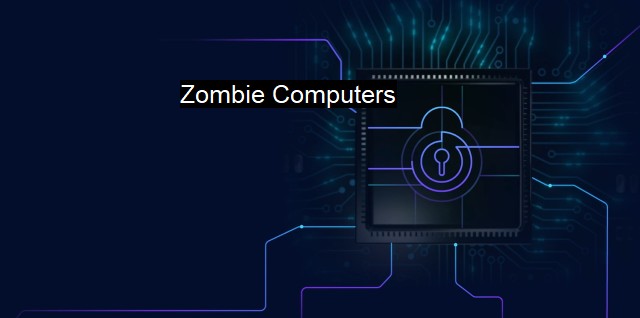What are Zombie Computers?
Rising Threats: Zombie Computers and the Need for Strong Cybersecurity and Antivirus Measures
A "zombie computer," also sometimes referred to as a bot, is a computer that has been infected by malicious software. This malware can allow a cyber criminal or 'bot master' to take remote control of the infected computer from a location removed from the infected system. Once a computer becomes a zombie, it functions as a puppet or remote-controlled device, executing the commands of its controller behind the scenes. This act is usually done with the owner's lack of knowledge, thus making their system a hidden participant in a larger web of cybercrime known as a botnet.The term 'zombie computer' comes from the concept that the malware-infected computer is dead to the owner but brought back to life by the attacker serving the hacker's intentions. This revivification hijacks the system, turning a useful computer into a destructive tool.
Botnets, or collections of zombie computers, can perform numerous illegal tasks. This includes denial-of-service attacks against targeted systems or network, sending millions of spam messages, analyzing network traffic to intercept sensitive personal and financial information, launching click fraud campaigns, spreading additional malicious software, and disrupting infrastructure on a grand scale. Botnets are a grave global security threat and form a significant part of the dark underbelly of the internet.
What's concerning is that Detecting whether a computer has become a zombie is not straightforward. It is designed to operate secretively without the computer user's knowledge. There could be thousands of zombie computers worldwide, given the sophistication of the malware and the average user's lack of familiarity with the depths of their computer systems.
There are some signs that may suggest that a computer has been compromised. These include a sudden reduction in system performance, an unusual increase in network traffic, frequent crashes, and the occasional appearance of unfamiliar programs or files.
One key practice to prevent a system from becoming a zombie is installing a robust and reliable antivirus software from a reputable vendor. Antivirus software is designed to scan, identify, and remove a wide range of malicious programs, tackling threats even before they take hold of your system. Regular updates of antivirus software are vital since new malware variants are being developed constantly by cybercriminals.
Firewall activation plays a crucial role in preventing external unauthorized access to your computer. It serves as a proactive defense by monitoring and controlling information entering and leaving your computer based on pre-set security rules.
User caution is equally important when accessing the internet. Clicking on suspicious links, opening unexpected email attachments, and downloading software or content from unreliable sources are common ways of inviting malware into your system.
'zombie computers' represent a significant cybersecurity issue globally. They allow cybercriminals to perform menacing stunts and even disrupt massive networks. But while the concept of a zombie computer may be unsettling, users should take comfort in knowing that they can protect themselves proactively by installing and updating antivirus software, enabling firewalls, and following safe internet practices. Through continued vigilance, improvements in malware detection and the development of more potent antivirus software, the threat presented by zombie computers can, and will, be reduced.

Zombie Computers FAQs
What are zombie computers?
Zombie computers, also known as botnets, are computers that have been infected with malware and can be controlled remotely by a cybercriminal without the owner's knowledge. These infected computers can perform malicious activities, such as sending spam emails, launching DDoS attacks, and stealing personal information.How do zombie computers infect other computers?
Zombie computers can infect other computers through various methods, such as email attachments, drive-by downloads, social engineering, and exploiting vulnerabilities in software. Once a computer is infected, the malware can spread to other computers on the same network or the internet, creating a botnet.How can I detect if my computer is a zombie computer?
Detecting a zombie computer can be difficult, but some common signs include slow performance, unexplained network activity, unusual pop-ups or error messages, and unexpected program behavior. Installing reliable antivirus software and regularly scanning your computer can also help detect and remove malware infections.How can I protect my computer from becoming a zombie computer?
To protect your computer from becoming a zombie computer, you should always keep your software and operating system up to date, use strong and unique passwords, and avoid clicking suspicious links or downloading files from untrusted sources. It's also important to install trusted antivirus software and regularly scan your computer for malware. Lastly, be cautious of phishing emails or messages that may attempt to trick you into revealing sensitive information or downloading malicious software.| | A | | | B | | | C | | | D | | | E | | | F | | | G | | | H | | | I | | | J | | | K | | | L | | | M | |
| | N | | | O | | | P | | | Q | | | R | | | S | | | T | | | U | | | V | | | W | | | X | | | Y | | | Z | |
| | 1 | | | 2 | | | 3 | | | 4 | | | 7 | | | 8 | | |||||||